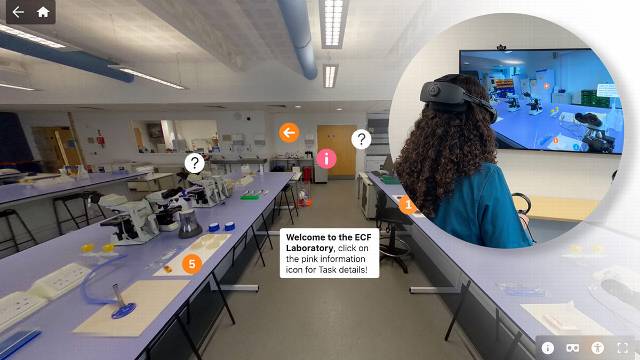The impact of wet weather on Shropshire’s farmers has been the focus of a BBC radio piece featuring a Harper Adams University expert.
With recent rain causing issues for both crops and livestock, Radio Shropshire spoke to a farming family in Pentre, in the north of the county, to talk about how the downpours have affected them. The Jones family talked with reporter Kate Tebby about the recent weather and its impact on what they described as their ‘busiest time of year’ - with calving on the farm.
Breakfast Show Presenter Adam Green then spoke with Dr Lucy Crockford, a Senior Lecturer in Soil and Water Management at Harper Adams University, to explore exactly how challenging the current wet weather has been for the county’s farmers.
She said: “For the last six months, we have had unprecedented rain and it’s not surprising that farmers are finding it very difficult to do any sort of agricultural practice on their land.
“Last year, we had twice the amount of rain at Harper than we did for the previous year – so when you are looking at how that water is being distributed over the year, it is making typical agricultural activity almost impossible.
“Even if you are looking at fields that are possibly going to be flooded from the local river, that’s quite obviously going to be a problem – but we are seeing it across the catchments now, where we have pockets of land that just cannot be worked.”
Lucy explained how seeds in the soil need oxygen to begin germination – and that the current weather was compounding other issues with soil structures.
She also set out ways in which farmers could improve both this structure and the management of water in their soils – and how the Soil and Water Management Centre at Harper Adams could help them with conferences, seminars and education.

Adam then also asked Lucy how climate change and flooding issues were being taught at Harper Adams as the University works to educate the next generation of farming, land use, and food professionals.
She said: “We have really strong climate models that show us we’re expecting it to be warmer and wetter as we go forward – so with more rain, comes more challenges in the soil management area.
“In our teaching, we get try to students to picture how they are going to possibly explore different types of crops, maybe consider different types of land use – because there are some parts of the country which are just not going to be able to have agricultural production in the classical sense.
“So here at Harper, we’re exploring paludiculture – which is wet farming – we’re purposely going to be flooding an area of lowland peat, to actually grow crops on that as well.
“There are free farmer sessions for them to come to that; every year we have a symposium in September, so farmers are more than welcome to sign up to that; and also, the general term paludiculture also covers farming, even in stock – so if you’ve got types of stock that you can raise on much wetter ground.
“Historically, sheep were considered a good option because they’re lighter – but actually they don’t get on so well in wet ground: there are actually native cattle that really quite like wet ground, are able to manage it, and they are doing really well in some of the more wetland farms we’re working with.”
Finally, Lucy explored the types of crops which farmers can grow on wetter ground.
She added: “Really, we’re talking about trying to think about companion cropping – so choosing deep-rooting plants that can improve infiltration.
“So, as opposed to finding a crop that’s more resilient in a wet soil, it’s trying to improve that soil in the first place, unless you want to go down the paludiculture route – which is actually wet farming, so things like celery, cranberries, typher, and sphagnum – which obviously would have then created peat in the first place.
“So there are obviously some wet crops – even rice, though I don’t think we’re growing rice here yet!”
You can listen again to the piece here – from 3 hr 7 min 28 seconds in.
 Blog: Veterinary Medicine students step into immersive 360° laboratory
At Harper & Keele Veterinary School, students are stepping beyond the traditional microbiology bench and into an immersive 360° labo …
Posted
Yesterday
Blog: Veterinary Medicine students step into immersive 360° laboratory
At Harper & Keele Veterinary School, students are stepping beyond the traditional microbiology bench and into an immersive 360° labo …
Posted
Yesterday





